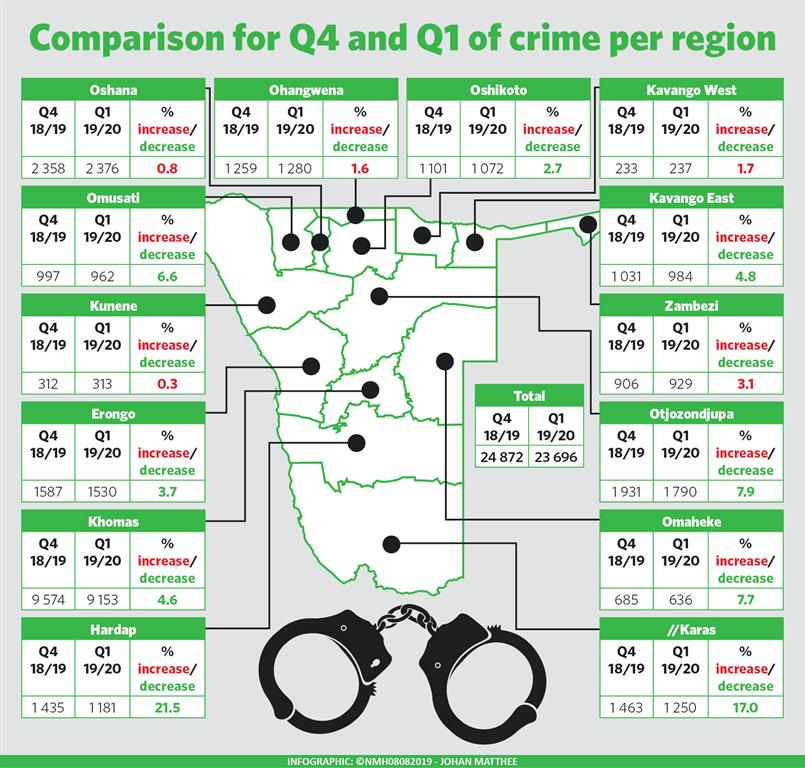Operation Kalahari Desert resumes
The second phase of the joint anti-crime campaign known as Operation Kalahari Desert will resume on Monday, the police have announced.
Police spokesman Edwin Kanguatjivi said all participating members will undergo a three-day crash course focusing on proper conduct in the execution of their duties.
The first phase of the operation from 11 May to 30 June came under fire for several incidents of alleged brutality, including the shooting of 22-year-old Fambaune Black.
Kanguatjivi said “a few incidents of alleged misconduct” were investigated.
The nationwide anti-crime operation involves various stakeholders such as the Namibian Police, the Namibian Defence Force (NDF), the Correctional Services, and the Windhoek City Police. Kanguatjivi said the first phase of the operation registered “magnificent successes” against crime, resulting in calls from the public that combined operations with the NDF should continue. According to him 1 996 suspects were arrested during the first phase of the operation, 762 of them for serious offences such as murder, attempted murder and rape. Furthermore, 1 711 dangerous weapons were confiscated, 4 454 summonses issued, drugs to the value of N$683 072 confiscated and 284 head of stolen livestock recovered.
“We request the public to desist from any acts of lawlessness, undermining of authority, lack of cooperation, unruly and any other unbecoming behaviour. Such behaviour will not be tolerated at all,” said Kanguatjivi.
He added that the public should appreciate the efforts made by law-enforcement agencies to maintain law and order.
In November last year a similar campaign codenamed Operation Hornkranz was launched. Kanguatjivi said statistics proved that these operations made a substantial difference. Before Operation Hornkranz, the number of reported crimes in August 2018 stood at
8 947, in September at 8 656, in October at 8 927 and in November at 8 455. In comparison, 8 560 cases were recorded in December, dropping to 8 046 in January and 8 039 in February.
In March, when there was a break in Operation Hornkranz, the figure went up to 8 787 cases.
With the resumption of the operation in April, reported crimes dropped to 8 186, followed by 8158 in May and 7 379 in June. Meanwhile, the police say the crime rate has decreased in most regions.
The biggest drop has been in the Hardap Region, where the crime rate dropped more than 21% from the last quarter of 2018 to the first quarter of this year. The //Karas Region follows closely behind with a drop of 17%.
Only five regions saw an increase in crimes.
ELLANIE SMIT
Police spokesman Edwin Kanguatjivi said all participating members will undergo a three-day crash course focusing on proper conduct in the execution of their duties.
The first phase of the operation from 11 May to 30 June came under fire for several incidents of alleged brutality, including the shooting of 22-year-old Fambaune Black.
Kanguatjivi said “a few incidents of alleged misconduct” were investigated.
The nationwide anti-crime operation involves various stakeholders such as the Namibian Police, the Namibian Defence Force (NDF), the Correctional Services, and the Windhoek City Police. Kanguatjivi said the first phase of the operation registered “magnificent successes” against crime, resulting in calls from the public that combined operations with the NDF should continue. According to him 1 996 suspects were arrested during the first phase of the operation, 762 of them for serious offences such as murder, attempted murder and rape. Furthermore, 1 711 dangerous weapons were confiscated, 4 454 summonses issued, drugs to the value of N$683 072 confiscated and 284 head of stolen livestock recovered.
“We request the public to desist from any acts of lawlessness, undermining of authority, lack of cooperation, unruly and any other unbecoming behaviour. Such behaviour will not be tolerated at all,” said Kanguatjivi.
He added that the public should appreciate the efforts made by law-enforcement agencies to maintain law and order.
In November last year a similar campaign codenamed Operation Hornkranz was launched. Kanguatjivi said statistics proved that these operations made a substantial difference. Before Operation Hornkranz, the number of reported crimes in August 2018 stood at
8 947, in September at 8 656, in October at 8 927 and in November at 8 455. In comparison, 8 560 cases were recorded in December, dropping to 8 046 in January and 8 039 in February.
In March, when there was a break in Operation Hornkranz, the figure went up to 8 787 cases.
With the resumption of the operation in April, reported crimes dropped to 8 186, followed by 8158 in May and 7 379 in June. Meanwhile, the police say the crime rate has decreased in most regions.
The biggest drop has been in the Hardap Region, where the crime rate dropped more than 21% from the last quarter of 2018 to the first quarter of this year. The //Karas Region follows closely behind with a drop of 17%.
Only five regions saw an increase in crimes.
ELLANIE SMIT





Comments
Namibian Sun
No comments have been left on this article